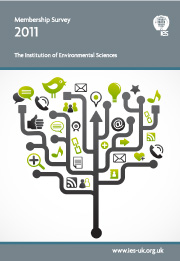The Institution of Environmental Sciences regularly surveys its members to identify trends in how different services are valued and gain members’ opinions on potential new services or developments for the future.
Method: At the end of 2011 an online questionnaire was completed by 100 members, answering questions on the importance of membership services and seeking input onto the current status of publications, staff service and membership fees. These results were aggregated and compared against the results from previous years to identify long-term trends.
Key findings:All of the services were rated as at least ‘important’ by more than half of the membership. This suggests that the IES is successfully meeting the needs and interest of members through the current provision of services. Members’ opinions on individual services were analysed in further detail:
Post-nominal: 82% of respondents rated the post-nominal as ‘important’ or ‘very important’. This is an 11% increase since 2009, which is to be the result of environmental professionals seeking to demonstrate their personal capability to work in the sector in the current difficult employment circumstances.
Charterships: These opportunities are highly valued be members, with the Chartered Environmentalist (CEnv) rated by 82% of respondents as ‘important’ or ‘very important, and 70% valuing the Chartered Scientist (CSci) as such. The rating of the CEnv has declined slightly from previous years, which may be due to the provision of the CSci.
Careers support: These services received their highest ever rating in 2011, which reflects the current economic climate. These services are of high value to members who are recently graduated or seeking work in the sector.
Journal: The journal is highly valued by almost all the membership (93% stated it was ‘important’ or ‘very important’). This publication has been consistently been rated as ‘excellent’ or ‘good’ by around four fifths of respondents over the past five years, with the percentage rating it as ‘excellent’ rising by 21% since 2007. 27% of respondents stated that the journal has improved since 2010, which reflects the well-received redesign in 2011 to make the journal more accessible and engaging for all the membership, across career stages and sectors.
Newsletter: 80% of respondents rated it as above average, with 22% stating the monthly e-newsletter is ‘excellent’. The newsletter has been consistently rated as good, but 2011 presented the best ratings yet. This reflects the efforts to ensure the newsletter is relevant and informative.
Website: The website received its highest ratings since 2007, with 65% of respondents rating it as ‘excellent’ or ‘good’. Use of the website has increased consistently over the past five years, with 75% members now using the website at least once per month. In early 2012 the IES is launching a new website, which will be even more engaging and accessible for members.
Social media: The majority of members belong to at least one social networking site, with over 70% of respondents currently having a profile on LinkedIn. Only 11% of respondents were on Twitter. Social networking sites offer a useful mechanism for engaging members, and so the IES is looking to develop its current strategy through maintaining its Twitter account and investigating other options such as LinkedIn.
Interaction with IES staff: Excellent customer service is of great importance to the IES. Members of rated interactions with the IES staff as consistently high over the past 5 years. 2011 saw an increase 10% since 2009 in the number of respondents rating their interactions as ‘excellent’ or ‘good’. Increased office capacity and the increased expertise of staff has improved the quality of responses in recent years.
Membership fees: The majority of IES members pay their own membership fees (54%), though employers pay the fees of 42% of respondents. The IES has introduced greatly reduced fees for members on maternity leave or currently unemployed to ensure that they remain affordable.
The 2011 IES Membership Survey has demonstrated that services remain highly valued by the membership and are continuing to improve in quality. In 2012 the IES is committed to continue to maintain current standards and develop new services that continue to meet the needs of members.


